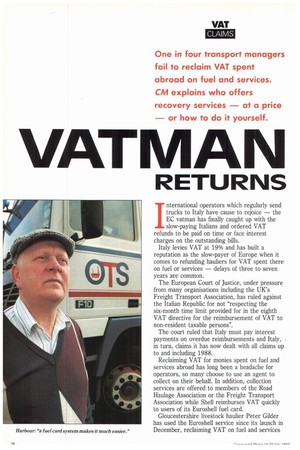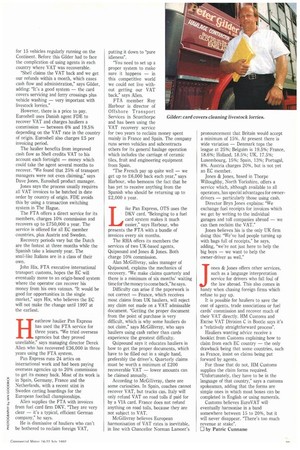VA - TR/IAN
Page 40

Page 41

If you've noticed an error in this article please click here to report it so we can fix it.
RETURNS
One in four transport managers fail to reclaim VAT spent abroad on fuel and services. CM explains who offers recovery services — at a price — or how to do it yourself.
1 nternational operators which regularly send trucks to Italy have cause to rejoice — the EC vatman has finally caught up with the slow-paying Italians and ordered VAT refunds to be paid on time or face interest charges on the outstanding bills.
Italy levies VAT at 19% and has built a reputation as the slow-payer of Europe when it comes to refunding hauliers for VAT spent there on fuel or services — delays of three to seven years are common.
The European Court of Justice, under pressure from many organisations including the UK's Freight Transport Association, has ruled against the Italian Republic for not "respecting the six-month time limit provided for in the eighth VAT directive for the reimbursement of VAT to non-resident taxable persons".
The court ruled that Italy must pay interest payments on overdue reimbursements and Italy, . in turn, claims it has now dealt with all claims up to and including 1988.
Reclaiming VAT for monies spent on fuel and services abroad has long been a headache for operators, so many choose to use an agent to collect on their behalf. In addition, collection services are offered to members of the Road Haulage Association or the Freight Transport Association while Shell reimburses VAT quickly to users of its Euroshell fuel card.
Gloucestershire livestock haulier Peter Gilder has used the Euroshell service since its launch in December, reclaiming VAT on fuel and services
for 15 vehicles regularly running on the Continent. Before this Gilder had to face the complication of using agents in each country where VAT was recoverable.
"Shell claims the VAT back and we get our refunds within a month, which eases cash flow and administration," says Gilder, adding: "It's a good system — the card covers servicing and ferry crossings plus vehicle washing — very important with livestock lorries."
However, there is a price to pay. Euroshell uses Danish agent FDE to recover VAT and charges hauliers a commission — between 6% and 19.5% depending on the VAT rate in the country of origin. Euroshell also charges £5 per invoicing period.
The haulier benefits from improved cash flow as Shell credits VAT to his account each fortnight — money which could take the agent several months to recover. "We found that 25% of transport managers were not even claiming," says Dave Jones, Euroshell product manager.
Jones says the process usually requires all VAT invoices to be batched in date order by country of origin. FDE avoids this by using a transaction switching system in The Hague.
The FTA offers a direct service for its members, charges 10% commission and recovers up to £750,000 a year. The service is offered for all EC member countries, plus Austria and Sweden.
Recovery periods vary but the Dutch are the fastest at three months while the Spanish take a leisurely year. The snail-like Italians are in a class of their own.
John Hix, FTA executive international transport customs, hopes the EC will eventually move to an origin-based system where the operator can recover his money from his own vatman. "It would be good for opportunities in the single market," says Hix, who believes the EC will not make the change until 1997 at the earliest.
Heathrow haulier Pan Express has used the FTA service for three years. "We tried overseas agencies but they proved unreliable," says managing director Derek Allen who has recovered £36,000 in three years using the FTA system.
Pan Express runs 24 artics on international work and had been paying overseas agencies up to 20% commission to get its money back. Most of its work is in Spain, Germany, France and the Netherlands, with a recent stint in Sweden carting hoardings for the European football championships.
Allen supplies the FTA with invoices from fuel card firm DKV. "They are very clear — it's a typical, efficient German company," he says.
He is dismissive of hauliers who can't be bothered to reclaim foreign VAT, putting it down to "pure idleness".
"You need to set up a proper system to make sure it happens — in this competitive world we could not live without getting our VAT back," says Allen.
FTA member Roy Harbour is director of Offshore Transport Services in Scunthorpe and has been using the VAT recovery service for two years to reclaim money spent mainly in France and Spain. The company runs seven vehicles and subcontracts others for its general haulage operation which includes the carriage of ceramic tiles, fruit and engineering equipment from Spain.
"The French pay up quite well — we get up to £6,000 back each year," says Harbour, who bemoans the fact that he has yet to receive anything from the Spanish who should be returning up to £2,000 a year.
Like Pan Express, OTS uses the DKV card. "Belonging to a fuel card system makes it much easier," says Harbour, who presents the FTA with a bundle of invoices every six months.
The RHA offers its members the services of two UK-based agents, Quipsound and Jones & Jones. Both charge 10% commission.
Alan McGillivray, sales manager of Quipsound, explains the mechanics of recovery. "We make claims quarterly and there is a minimum of six months' waiting time for the money to come back," he says.
Difficulty can arise if the paperwork is not correct — France, which receives most claims from UK hauliers, will reject any claim not made on a VAT admissable document. "Getting the proper document from the point of purchase is very difficult, which is why some hauliers do not claim," says McGillivray, who says hauliers using cash rather than cards experience the greatest difficulty.
Quipsound says it educates hauliers in how to get the proper documents, which have to be filled out in a single hand, preferably the driver's. Quarterly claims must be worth a minimum of £200 recoverable VAT — lower amounts can be claimed annually.
According to McGillivray, there are some curiosities. In Spain, coaches cannot recover VAT, but trucks can. Italy will only refund VAT on road tolls if paid for by a VIA card. France does not refund anything on road tolls, because they are not subject to VAT.
McGillivray believes European harmonisation of VAT rates is inevitable, in line with Chancellor Norman Lamont's
pronouncement that Britain would accept a minimum of 15%. At present there is wide variation — Denmark tops the league at 25%; Belguim is 19.5%; France, 18.6%; Holland, 18.5%; UK, 17.5%; Luxembourg, 15%; Spain, 13%; Portugal, 8%. Austria charges 20%, but is not yet an EC member.
Jones & Jones, based in Thorpe Willoughby, North Yorkshire, offers a service which, although available to all operators, has special advantages for ownerdrivers — particularly those using cash.
Director Bryn Jones explains: "We exchange fuel receipts for invoices which we get by writing to the individual garages and toll companies abroad — we can then reclaim the VAT."
Jones believes his is the only UK firm doing this: "We've had people turning up with bags full of receipts," he says, adding, "we're not just here to help the big boys — we want to help the owner-driver as well."
Jones & Jones offers other services, such as a language interpretation service for drivers who fall foul of the law abroad. This also comes in handy when chasing foreign firms which refuse to pay up.
It is possible for hauliers to save the cost of agents, trade associations or fuel cards' commission and recover much of their VAT directly. HM Customs and Excise VAT Division C in Bootle says it's a "relatively straightforward process".
Hauliers wanting advice receive a booklet from Customs explaining how to claim from each EC country — the only drawback being that some countries, such as France, insist on claims being put forward by agents.
For those that do not, HM Customs supplies the claim forms required. "Unfortunately, they have to be in the language of that country," says a customs spokesman, adding that the forms are simple ones in which most boxes can be completed in English or using numerals.
Customs believes Euro VAT will eventually harmonise in a band somewhere between 15 to 20%, but it will never disappear. "There's too much revenue at stake".
El by Patric Cunnane
















































































